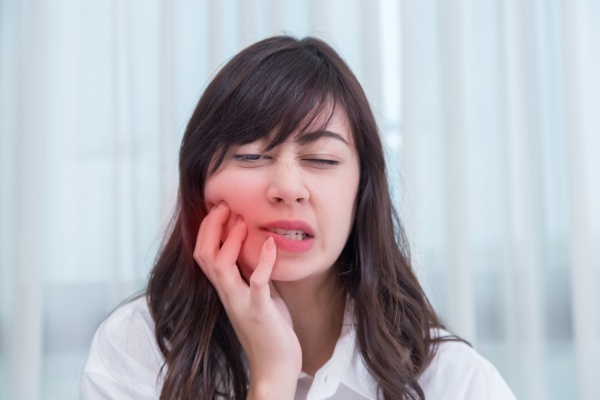Help for Nighttime Tooth Grinding From a Dentist in Lilburn

If you are one of the many people who grind their teeth, our dentist in Lilburn can help you come up with ways to minimize the damage being done to your teeth. Medically termed bruxism, teeth grinding is one of those things that most people who suffer from it do not even realize.
It typically occurs during sleep, making it difficult for people who do not share a room with anyone to realize they have the condition. It usually takes a family member/partner saying something about it or a dentist in Lilburn noticing its signs and symptoms during a routine checkup.
There is still a lot to be learned about tooth grinding, but it is known to be triggered by certain medical conditions, stress, crooked teeth or missing teeth. Symptoms of bruxism include:
- A constant headache
- A sore jaw
- Tender jaw
- Multiple broken or loose teeth
- Temporomandibular joint problems
- Hearing loss
- Changes to facial structures
Teeth grinding can lead to severe damage to a person's teeth, and dental restorations might be needed to restore their function and appearance. Teeth grinding can also damage prosthetics like implant, crowns and veneers.
How a dentist in Lilburn can help with teeth grinding
One effective way to reduce the damage being done to a person's teeth by bruxism is by inserting a night guard before going to bed. The device looks a lot like a regular mouthguard, but it serves to reduce the pressure on a person's teeth when they grind them.
The most effective types of mouthguards tend to be those that are custom-made by a dentist. It ensures the patient gets a prosthetic that fits nicely on their top set of teeth. Night guards are not designed to stop teeth grinding, but, instead, to reduce the damage caused by the condition.
Other things patients can do to manage teeth grinding include:
- Exercise regularly: Exercise helps to reduce a person's stress levels, which is one of the factors that can trigger teeth grinding. Patients should aim for a minimum of 30 minutes of exercise each day
- Warm baths: A warm bath right before bed helps to relax the jaw muscles. Patients who are not fond of baths can simply apply a warm compress to their jaw before bedtime
- Relax: Factors like anxiety also trigger teeth grinding. People who are calm and relaxed before going to bed are less likely to grind their teeth
- Train new habits: People who grind their teeth during the day can take some conscious steps to stop doing it. For example, the tongue can be placed between teeth to discourage the behavior. Patients should make an effort to drop their jaw whenever they feel their top and bottom set of teeth touching each other
Do not let teeth grinding ruin your smile
If you are battling with bruxism, head to our Lilburn office for an evaluation and a customized mouth guard. Say goodbye to waking up with a sore jaw or headaches.
Request an appointment here: https://www.lilburnfamilydentistry.com or call Lilburn Family Dentistry at (770) 800-0178 for an appointment in our Lilburn office.
Check out what others are saying about our services on Yelp: Read our Yelp reviews.
Recent Posts
Restorative dentists do not only repair damaged teeth. They also enhance overall oral health. From addressing cavities to replacing missing teeth, these dental professionals provide a variety of treatments that restore the function of damaged teeth and protect your oral health.Restorative dentistry is the dental specialty that restores damaged and decayed teeth. These professionals also…
A restorative dentist plays an important role in dental health and aesthetics. Damaged or missing teeth can impact a smile's appearance and cause problems for oral health and function. This is why restorative dentists offer a range of repair and replacement procedures to keep a patient's smile looking and feeling the way it should.A restorative…
ClearCorrect® is a teeth-straightening system that uses a series of transparent, custom-made, removable aligners to shift the teeth to their proper positions. It is an effective alternative to traditional braces and is an ideal choice for those seeking non-intrusive teeth-straightening treatment. Continue reading to find out how ClearCorrect can help correct your teeth’s alignment.The dentist…
Your restorative dentist can present treatments that can fix your dental issues. You can have a new smile after your appointment. Some dental problems may need more than one visit. Knowing when to see a restorative dentist can help you get the right procedure to bring back your smile and dental health.A restorative dentist can…


